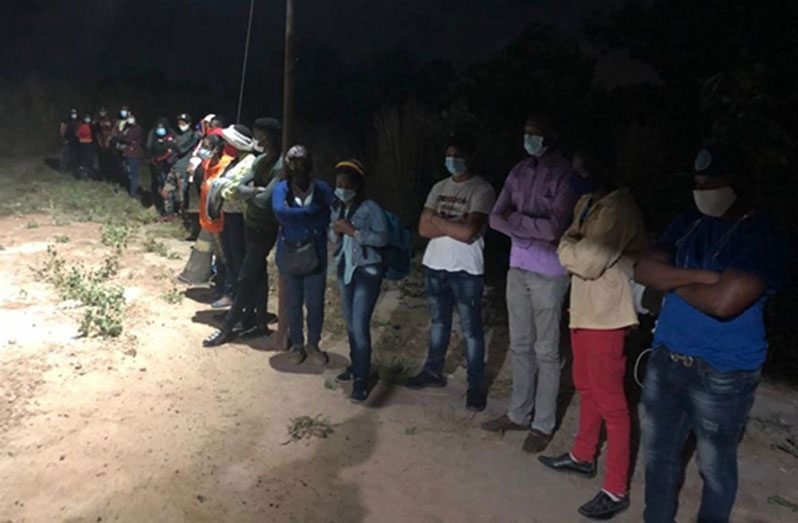–hailed for increased detection, prosecution of traffickers
THE Government of Guyana fully meets the minimum standards for the elimination of Trafficking in Persons (TIP), according to a report released by the U.S. State Department on Thursday.
The comprehensive document has acknowledged that the government continued to demonstrate serious and sustained efforts during the reporting period. As a result, Guyana has remained on Tier 1 of the TIP index. Among the accomplishments Guyana has achieved is being recognised for its completion of a draft amendment of the Combating Trafficking of Persons Act, increased identification and investigation of trafficking-related matters, the launch of the first ever bilingual anti-trafficking hotline, and the opening of trafficking shelters outside of the capital area. Notwithstanding those accomplishments, the report has indicated that authorities in Guyana have investigated and prosecuted fewer suspected traffickers, identified fewer victims of trafficking, and did not provide adequate screening or shelter for child and male victims. There are also insufficient labour inspectors, and their training in human trafficking is inadequate. As a result of the shortcomings, the U.S. State Department has highlighted a number of priority recommendations, among them the implementation and training of law enforcement officials and front-line responders in written trauma, informed victim identification and referral procedures; reducing delays in court proceedings and pre-trial detention of suspects and funding specialised victim services, particularly for child, adult male, and Venezuelan victims in their native language.
It was also recommended that Guyana vigorously investigate and prosecute sex and labour trafficking cases under the TIP Act, including those involving child victims, and hold convicted traffickers, including complicit public officials, accountable by investigating, prosecuting, convicting, and imposing sufficiently stringent sentences.
The report also recommends that police and law enforcement officials be held accountable for abuse of vulnerable individuals and intimidation of victims in shelters, and urges the authorities to provide additional protection for victims to testify against traffickers in a way that minimizes re-traumatisation.
Further, the report has called for the strengthened capacity of labour inspectors to identify and refer victims of labour trafficking, and wants the execution and publishing of a robust monitoring and evaluation framework for anti-trafficking policies and efforts, as well as increased engagement with officials involved in anti-trafficking activities in other countries, to exchange best practices in trafficking investigation and screening, including ways to maintain shelter location confidentiality.
VICTIMS IDENTIFIED
The report has noted that in 2019, the government identified 102 victims, 63 of whom were victims of sex trafficking, while 39 were caught in a ring of labour trafficking. This represented a decrease from 156 identified victims in 2018 and 131 in 2017.
“The victims came from Guyana as well as the Dominican Republic, Haiti, and Venezuela,” the report notes.
Just recently, the People’s Progressive Party/Civic (PPP/C) Government instituted visa requirements for Haitian nationals travelling to Guyana, a move that follows the continued detection of undocumented Haitians who are suspected to be victims of trafficking.
The U.S. report also points to the assistance that the Government of Guyana has given to victims of violence and trafficking.
To this end, it was noted: “Victims could receive shelter, food, training, and psychological therapy.”
The report also points to the efforts of the Ministry of Human Services and Social Security, which has funded transportation costs and police escorts for victims staying outside a shelter, as well as the granting of deportation relief to 135 foreign victims.
“The government reported granting foreign victims temporary residence status and work permits if requested. The government reported facilitating the repatriation of one Guyanese national trafficked abroad, to whom it provided counselling and reintegration assistance,” the TIP report acknowledges.
Only recently, Attorney-General and Minister of Legal Affairs, Anil Nandlall defended the government’s move to implement visa requirements for Haitians travelling to Guyana. Nandlall said that the move is in keeping with the country’s international obligation to help prevent trafficking in persons. It is believed that Haitians account for the largest group of persons being trafficked to Guyana. As a matter of fact, immigration data has revealed that some 38,187 Haitians who travelled to Guyana between the period of 2015 and June, 2021, failed to leave the country, at least through legal means; this is coupled with mounting complaints about Guyana being used as a trans-shipment point in the overarching scheme of human trafficking by various foreign governments.
Specifically, the TIP report has recognised Guyana for having increased its efforts to prevent trafficking altogether.
“The government monitored human trafficking in the country, and released the results of monitoring in the media. The government reported that 25 hotline calls resulted in trafficking investigations during the reporting period,” the report indicated.
It also pointed to the drafting of a National Action Plan to Eliminate Child Labour, which deals with the recruiting, retaining, and training labour inspectors to more effectively monitor child labour and extractive industry workers, particularly in light of Guyana’s fast-growing oil operations where children are particularly vulnerable to forced labour.



.jpg)











